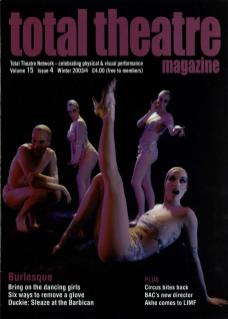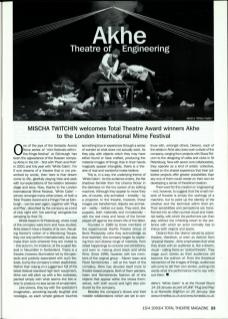One of the joys of the fantastic Aurora Nova series of 'mini-festivals-within the-fringe-festival' at Edinburgh has been the appearance of the Russian company Akhe in the UK – first with Pooh and Prah in 2001 and this year with White Cabin. For if one dreams of a theatre that is not prescribed by words, then here is that dream come to life, gleefully playing hide-and-seek with our expectations of the relation between stage and story. Now, thanks to the London International Mime Festival, White Cabin – winner, amongst many other prizes, of both a Total Theatre Award and a Fringe First at Edinburgh – can be seen again, together with Plug and Play, described by the company as a kind of club night with ‘live painting' alongside live sampling by their DJ.
Whilst based in St Petersburg, where most of the company were born and have studied, Akhe doesn't have a theatre of its own. Recalling Kantor's notion of a Wandering Troupe, they not only perform internationally, but also make their work wherever they are invited to – this autumn, for instance, at the puppet festival in Neuchâtel in Switzerland. Theirs is a theatre, however, illuminated not by the spectacle and publicity associated with such festivals, but by the company's sheer playfulness. Rather than relying on a juggernaut full of the latest festival-standard high-tech equipment, Akhe can still pitch up with a few suitcases, packed simply with what seems like bric-a-brac to produce no less sense of amazement.
Like clowns, they toy with the spectator's imagination, provoking equally laughter and nostalgia, as each simple gesture touches something true in experience through a sense of wonder at what does not actually exist. As they play with objects which they may have either found or have crafted, producing the material images of things that in their hands magically appear intangible, theirs is a theatre of real and wonderful make-believe.
This is, in a way, the underlying theme of White Cabin. As the audience enters, the flat shadows familiar from the cinema flicker in the darkness on the tiny screen of an editing machine. Although they appear to move they are, of course, only animated – invisibly – by a projector. In the theatre, however, these images are transformed; objects are animated – visibly – before our eyes. They exist, like puppets, both materially and immaterially with the real mess and havoc of the former played off against the dream-life of the latter.
Founded in 1989 by three members of the experimental Yes/No Theatre Group of Boris Ponizovsky (who they acknowledge as their teacher), the company began by exploring their own diverse range of interests, from street happenings to concerts and exhibitions, and even to making short black and white films. Since 1996, however, with two members of the original group – Maxim Isaev and Pavel Semtchenko – still at the heart of the company, Akhe has devoted itself more to theatre-based projects. Both of them painters, Isaev and Semtchenko fashion all of the objects that appear within the shows themselves, with both sound and light also produced by the company.
Besides the company's shows and their notable collaborations (which are set to continue with, amongst others, Derevo), each of the artists in Akhe also does work outside of the company, ranging from projects with Slava Polunin to the designing of cafes and clubs in St Petersburg. Now with seven core collaborators, they operate as a kind of artists' collective, based on the shared experience that their collective projects offer greater possibilities than any one of them could create on their own for developing a sense of theatrical creation.
Their word for this creation is 'engineering’ – not, however, to suggest that the small miracle of theatre is simply the workings of a machine, but to point up the identity of the creative and the technical within their art. Their sensibilities and perceptions are transformed into an often-surreal visual and material reality, with which the performers can then play without the inhibiting resort to the pretence with which an actor normally has to imbue both objects and space.
Distinct from the 'drama' served by actors' theatre, therefore, or even as distinct from physical theatre', Akhe emphasises that what they share with an audience is, like a dream, visual – calling theirs an 'optical theatre'. They stage such stories as their audiences will become the authors of. From the theatrical reinvention of the images of things, audiences will come to tell their own stories, putting into words what the performance has to say with out them.
Akhe's White Cabin is at the Purcell Room 14-18 January as part of LIMF. Plug and Play is at Komedia Brighton on 20 January. See www.mimefest.co.uk and www.komedia.co.uk

